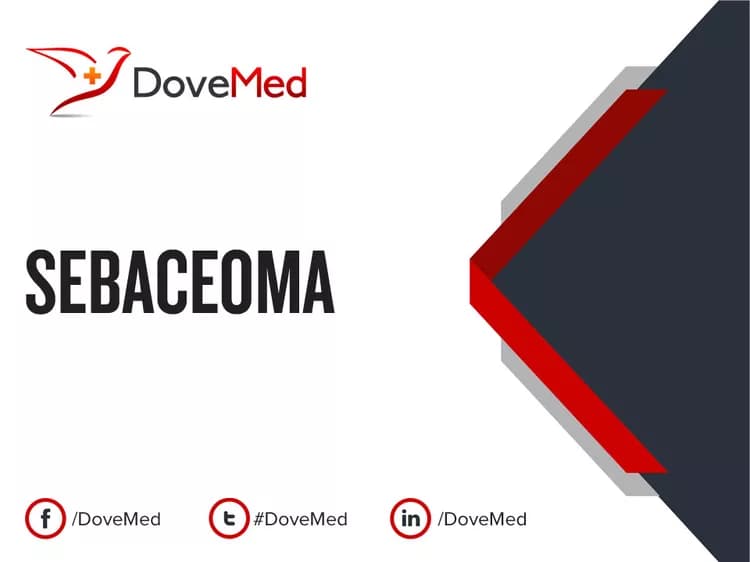What are the other Names for this Condition? (Also known as/Synonyms)
- Basal Cell Epithelioma with Sebaceous Differentiation
- Sebaceous Epithelioma
- Sebomatricoma
What is Sebaceoma? (Definition/Background Information)
- Sebaceoma is a rare benign tumor of the sebaceous gland occurring on the skin. These tumors may be associated with Muir-Torre syndrome (a rare genetic condition causing cancers at various parts of the body)
- They are also seen in association with Lynch syndrome, also known as hereditary nonpolyposis colorectal cancer
- Sebaceomas are slow-growing tumors that occur in the 7th decade of one’s life. It affects females more than males. Common locations where the tumor is observed is the head and neck region
- The cause of formation of the tumor is unknown but it may be due to genetic mutations. The presence of Muir-Torre syndrome (MTS) is a risk factor
- The treatment of choice for Sebaceoma skin tumor is complete surgical excision and removal of the tumor. The prognosis is typically excellent with suitable treatment
Who gets Sebaceoma? (Age and Sex Distribution)
- Sebaceoma is a rare type of skin tumor that is usually seen in older adults, in the 60-70 years age range. However, the condition may affect individuals of any age
- Both genders are affected, but this tumor is frequently found in women more than men
- All racial and ethnic groups are at equal risk and the condition is observed worldwide
What are the Risk Factors for Sebaceoma? (Predisposing Factors)
The risk factors of Sebaceoma include:
- Individuals with Muir-Torre syndrome (MTS), a genetic condition, have a high risk
- Lynch syndrome also has a higher risk for Sebaceoma and other sebaceous growths, benign and malignant
- A family history of Sebaceoma
It is important to note that having a risk factor does not mean that one will get the condition. A risk factor increases ones chances of getting a condition compared to an individual without the risk factors. Some risk factors are more important than others.
Also, not having a risk factor does not mean that an individual will not get the condition. It is always important to discuss the effect of risk factors with your healthcare provider.
What are the Causes of Sebaceoma? (Etiology)
- Sebaceoma is benign tumor that develops when the oil glands (sebaceous glands) of the skin is damaged. The reason for this damage and subsequent formation of the tumor remains unknown
- Some studies have shown that mutations in the DNA mismatched repair gene may be responsible for their development
What are the Signs and Symptoms of Sebaceoma?
The signs and symptoms of Sebaceoma may include:
- They usually occur as a single tumor on the skin at various locations of the body, most frequently in the head and neck region
- They range in color from yellow to orange and are present as painless papules on skin that grows slowly
- Generally, Sebaceomas that occur sporadically are usually solitary (single tumor), while when it is associated with other genetic syndromes, they may be many in numbers (multiple tumors)
How is Sebaceoma Diagnosed?
Sebaceoma may be diagnosed using the following tools:
- Physical exam and evaluation of medical history
- Examination of the skin by a dermatologist using a special magnified lens (dermoscopy)
- Skin biopsy: A biopsy is performed and sent to a laboratory for a pathological examination. The pathologist examines the biopsy under a microscope. After putting together clinical findings, special studies on tissues (if needed) and with microscope findings, the pathologist arrives at a definitive diagnosis
Many clinical conditions may have similar signs and symptoms. Your healthcare provider may perform additional tests to rule out other clinical conditions to arrive at a definitive diagnosis.
What are the possible Complications of Sebaceoma?
Generally, there are no significant complications that develop from Sebaceoma, unless it is associated with Muir-Torre syndrome or Lynch syndrome.
How is Sebaceoma Treated?
The treatment of Sebaceoma may include the following:
- A complete surgical excision of the tumor is the treatment of choice and is curative. The tumor does not recur on complete excision
- Treatment of underlying Muir-Torre syndrome/Lynch syndrome, if present
- Post-operative care is important: A minimum activity level is to be ensured until the surgical wound heals
- Follow-up care with regular screening and check-ups are important
How can Sebaceoma be Prevented?
Currently, there are no definitive methods to prevent the occurrence of Sebaceoma.
What is the Prognosis of Sebaceoma? (Outcomes/Resolutions)
- The prognosis of Sebaceoma is generally excellent with appropriate treatment of the condition. These tumors do not recur on a complete surgical removal, and they also do not metastasize
- If the tumor is associated with Muir-Torre syndrome or Lynch syndrome, then the overall prognosis depends upon the severity of the genetic disorder. MTS is associated with malignancies of various organs
Additional and Relevant Useful Information for Sebaceoma:
- Individuals with Sebaceoma should be encouraged to be tested for Muir-Torre syndrome
- Sebaceoma was previously known by the term Sebaceous Epithelioma
Related Articles
Test Your Knowledge
Asked by users
Related Centers
Related Specialties
Related Physicians
Related Procedures
Related Resources
Join DoveHubs
and connect with fellow professionals



0 Comments
Please log in to post a comment.